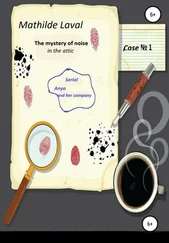Everything set right now, she took up heavy thread, needles, and scissors and sat on the couch with the bowl of green beans. She knotted the thread around a small stick and began to string the beans, skewering each one crosswise. Each bean gave off a sweet, lightly musty scent when she ran it down the thread, stopping when it barely touched the bean before it. When she was finished, she had a string three feet long to hang from a joist in the roof, close to the gable vent where the air circulated. The beans would dry and keep for months. Leather britches, her mother called them, best when cooked with fatback, but Arie hadn’t had pig in years. Thinking about a salty bit of ham or bacon was a train of thought best left unmolested.
The wind spun the roof turbine so fast that it started to hum, and the range hood vent rattled like a snare drum, and the front intermittently slapped itself against the frame. The feel of damp air found its way into the attic. Even with a sound roof above and ancient pink fiberglass insulation covering a great deal of the attic floor, there was no way to keep things snug—all those broken windows down below, and the old walls around her with their hairline splits and fissures.
With all her things seen to, she decided to attend her own self, too. She took her hair out of its braid and brushed it. That was a feat of some doing; there were not only small knots at the nape of her neck, but bits of leaves, from crawling through the underbrush to care for her snares. Her hair was thick and wavy, so she had to work the hairbrush hard. The arthritis in her wrist began to thrum. She tied up her braid again, and felt some cheered, back in the center of her life. At the mandala, she took three deep breaths. The fabric of her apron rippled slightly in an errant fillip of wind. She set her finger in the path and traced it around, back, toward the center. This was the time when she allowed memory to meld with the life at hand, all in images. She judged nothing, applied no sense of judgment to any of it, let all of it run through her and snag on nothing. This was simply life, passing through her. She was fifty-two years old, and she was alive—still alive, for some reason that didn’t matter. Finger circled to the left, then up, down and around to the right, always moving toward the center. All the years on God’s Land—fifteen—and after that her years with Granny and Pop. Then Pop died, and Arie stayed on with Granny, to be of help. Then Granny died. Then everyone died. Finger at the center now, and she followed the path back out. If she’d been able to see herself, she would know that her face was slack and her pupils large. All her muscles were soft and her breathing deep and slow.
The front door banged again down below, and she hardly noticed, but then heavy, dragging footsteps. She immediately bent and blew out the candles, waited. More steps inside. A female voice, slurred, hard to hear above the storm sounds. Arie counted on the noise outside to act as camouflage; she took three strides to the heating register, landing gingerly on the sides of her feet. Crouching, she waited.
“This is a bad place,” the girl said, sounding both frightened and petulant. “It can get us here.” More heavy footsteps gritting through the mess on the floor. He was carrying her.
“We have to have shelter, Arie,” Handy called. He waited. “I am going to put us up in here. If you don’t come down, I’ll do it myself. But I need help with her.”
She said nothing, just laid down so that she could look through the grate into the room below. He held the girl like a baby and glanced around in the dark. He’d never been here in his life, not that Arie knew of. He stepped carefully to his right, toward the hallway and the bedrooms, inching along flat-footed to avoid tripping over something. Arie could no longer see him through the vent. She got up and tiptoed directly over his head, listening. He stopped at Granny’s bedroom door. She didn’t hear the door open, but she heard him shuffle into the room. With all the windows intact in that room and the curtains drawn, it would be quieter, darker than the other rooms. A step, two, feeling his way. He bumped into the foot of the bed and stumbled. The girl moaned. Then a harsh cry from William, his footsteps now hurrying to the door, heaving it shut behind him.
“Fuck, Arie. What is that?” he cried at the ceiling.
Arie smiled. “Was,” she said. “Not is. It was your grandmother.” She spoke aloud, not knowing if he could hear her above the din outside, not caring now. He knew where she was.
The girl’s moan had devolved into thin and breathless weeping. “All right,” Handy told her. “Hush, now. Shut up, and we’ll find a spot for us.” He made it to the end of the hall and into Arie’s old bedroom, where the mildewed and mouse-eaten mattress hulked and the closet door stood open. Arie lay down on the old car seat, her sofa, to add her slight weight on the barricaded hatch, and to listen. After some bumping around, Handy said, “Lie still here. I have to close things up.
“You’re leaving me, Handy,” she wailed. “You’re leaving me to die.” Arie stiffened. In a house so quiet of voices for so long, the shout was like an assault.
“Shh,” he told her. “Hush up the noise. I won’t leave. You’d be dead already.” Moving out of the room now. There commenced a lot of effortful commotion downstairs, dragging and thumping in the entryway, so probably he was blocking the front door shut. Then the crunch and shuffle of his footsteps. He made a methodical circuit of the house, opening cupboards and cabinets, looking in the broom closet, where there was nothing but cobwebs and the dead, empty hot water heater. It was a fruitless search, Arie knew, for she’d ransacked the place herself, with utmost attention to detail, not leaving anything that would make the house seem likely to yield comfort. It was meant to seem fully picked-over and useless, and it did look so. That not a single intruder had ever so much as glanced at the ceiling, had not apparently thought to look for an attic or crawlspace despite the deep angles of the roofline outside, always surprised her—the survival instinct didn’t seem to include an overload of common sense, it sometimes seemed to her.
After finding nothing of use, Handy hesitated at their grandmother’s bedroom door again. In there, he might just find something. The bedding was still intact, all of it—mattress pad, sheets, blanket, comforter, and pillows. Trouble was, of course, Granny was there too, and a great deal of Granny had gone into the bedding. After three years the smell was nothing like it had once been, but her body and her bed were mostly of a piece now, melded like one thing, the liquid parts of her fused forever with the fibers of her nightgown and pillows.
Handy opened first one and then another of the drawers of Granny’s highboy chest. Now he would find something worth having: most of her clothes were still folded inside. In the closet were more clothes, and even a suit of Pop’s—the suit he’d worn when they’d married, which Granny had saved back when she gave away all the rest of his shirts and trousers and neckties. Everything in the room was exactly as it had been when Granny died, the framed pictures and electric alarm clock on the bedside table, her diploma from Humboldt State University over the antique desk, a mirrored tray on her vanity, filled with bottles of lotion and perfume and eyebrow pencils. The only thing Arie had taken away was Granny’s dressy winter coat, because it was heavy boiled wool, shin-length and black. Handy was apparently gathering things together, by the sound. After a couple of minutes, he went out and shut the door behind him. Not superstitious about the dead. Good.
The storm was letting up some, especially the wind, although it was still raining a pretty good clip. She gave a slight thought to the garden boxes over her head—they’d be getting good and heavy in this wet—but it didn’t worry her overmuch, small and evenly laid out as they were. She could hear her brother with the girl again, doing whatever he needed to tend her. She seemed to mostly start up her whining when Handy was right in with her, but he spoke to her now in a more tolerant fashion, soothing. Whatever he said and whatever he may have found to make her more comfortable, she did finally let up and go quiet. After a while, he went into the bathroom, and it took her a moment to puzzle out the sound she heard—pissing, into the empty bathtub, directly into the drain, by the sound. It was a funny thing, to hear that. Handy, who had grown up with never more than a hand-dug latrine on God’s Land, putting the defunct sewers to some use, now that they were just a hole in the world that would someday collapse, forgotten and un-mourned.
Читать дальше












